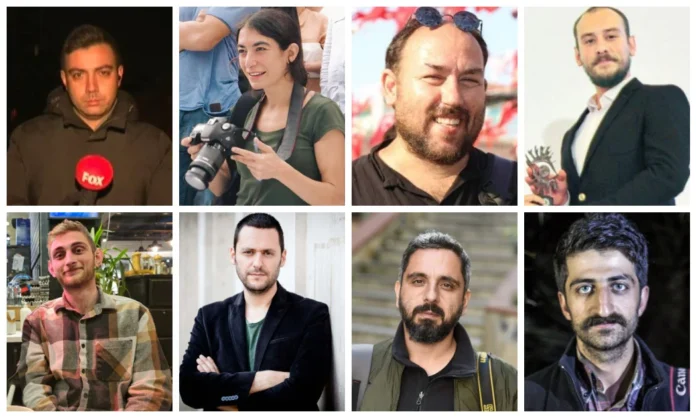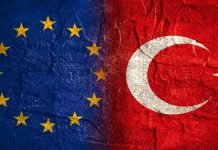The Turkish government intensified its crackdown on the media in the first quarter of 2025, jailing 25 journalists and launching dozens of prosecutions, Turkish Minute reported, citing a new report by Expression Interrupted, a press freedom monitoring group.
The report, titled “Freedom of Expression and the Press Agenda,” covers developments concerning freedom of the press in Turkey between January and March and reveals the worsening conditions for journalists.
According to the report, a total of 157 journalists were tried in 90 separate cases in the first three months of the year. Of the 32 cases concluded, 19 resulted in convictions, while 14 ended in acquittals. In total, 28 journalists were sentenced to 41 years, 1 month and 12 days in prison and fined a combined 8,850 Turkish lira ($270).
Prosecutors also filed 25 new indictments and opened 10 new investigations against journalists during the same period.
Terrorism-related charges lead cases
The most frequently used charges against journalists include “membership in a terrorist organization” under Article 314 of the Turkish Penal Code (TCK), cited in 27 cases, and “dissemination of terrorist propaganda” under Article 7 of the Counterterrorism Law, cited in 21 cases.
Other charges include “insulting public officials,” “insulting the president” and “denigrating state institutions.” Prosecutors also invoked Article 217/A of the TCK, commonly known as the “disinformation law,” in seven cases, alleging the spread of false or misleading information.
The law, which criminalizes the dissemination of “false or misleading information” and stipulates prison sentences of between one and three years, was passed in parliament in October 2022, drawing widespread criticism for being a draconian measure targeting free speech and independent journalists.
Journalists targeted at protests
Fifty journalists were detained during the quarter. Twenty-two were taken into custody while covering protests related to the arrest of İstanbul Mayor Ekrem İmamoğlu, a prominent opposition figure and the most powerful political rival of President Recep Tayyip Erdoğan, and the government’s appointment of a trustee to replace the elected mayor of Van in eastern Turkey.
Seven of those detained were later among the 25 journalists arrested. At the same time, 21 journalists were released from pretrial detention, including 10 arrested this year, seven of them while covering anti-government protests.
By the end of March, 34 journalists were behind bars, up from 33 at the beginning of the year.
The most recent journalist arrest took place in Turkey on Sunday when well-known political commentator Fatih Altaylı was jailed on accusations of threatening President Erdoğan. Altaylı, who was taken into custody Saturday night, has more than 2.8 million followers on X and 1.5 million YouTube subscribers, where he hosts a daily political show.
RTÜK issues record fines
In the first quarter of 2025, Turkey’s Radio and Television Supreme Council (RTÜK) fined media outlets critical of the government including Halk TV, NOW, SZC TV and TELE 1 a total of 25.3 million lira (about $780,000). Of that, 22 million lira was in response to coverage of İmamoğlu’s arrest.
In addition, SZC TV was handed a 10-day broadcast ban, and RTÜK issued a public warning accusing opposition outlets of “spreading pessimism” through negative reporting.
The council’s authority was also expanded to cover YouTube content. Channels such as Cumhuriyet, journalist Altaylı and FluTV were required to obtain broadcast licenses, prompting criticism from press freedom groups.
It is common for pro-opposition news channels in Turkey to face restrictions on their broadcasting through sanctions imposed by RTÜK, whose board members are appointed in proportion to the number of seats held by political parties in parliament, meaning that the ruling Justice and Development Party (AKP) currently dominates the agency.
After a failed coup in July 2016, the Turkish government summarily shut down nearly 200 media outlets due to their alleged links to terrorism or their alleged involvement in terrorist propaganda. The post-coup crackdown also included the detention of dozens of journalists, which briefly made Turkey the second-worst jailer of journalists in the world after China.
Turkey, which has been suffering from a poor record of freedom of the press for years, ranks 159th among 180 countries in the Reporters Without Borders (RSF) World Press Freedom Index published in May.
The country has long faced criticism for its treatment of journalists and its restrictions on independent media.















